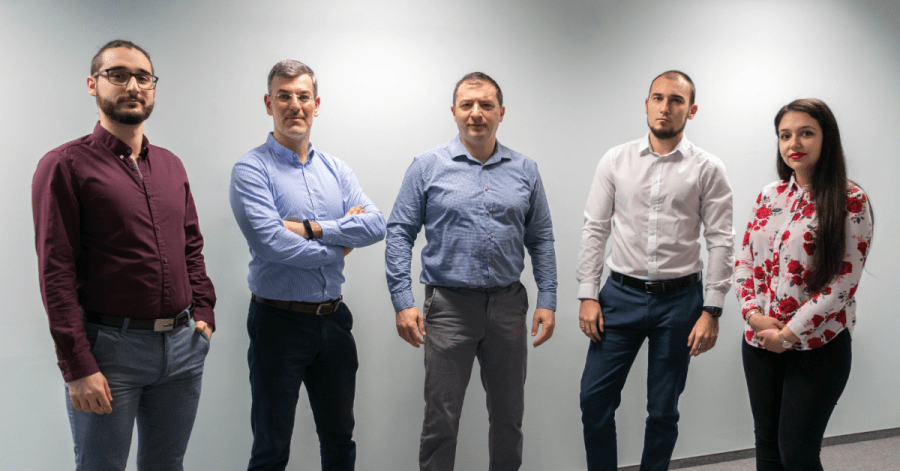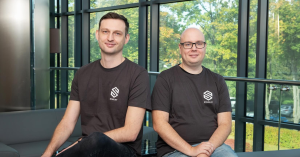CoLumbo, the Varna-based software for analysis of lumbar spine images obtained with MRI (magnetic resonance imaging), closed a €2.1M seed round. They aim to help more radiologists worldwide provide patients with reliable and low-cost diagnosis of back pain problems. The co-investors in the round are Eleven Ventures and BrightCap Ventures which were also joined by individual investors.
The product for computer-aided lumbar spine MRI reading and reporting is developed by software development company Smart Soft Healthcare. CoLumbo provides radiologists with pathology descriptions and creates reports with findings and measurements by combining AI algorithms and medical domain knowledge to read, segment, measure, and classify MRI images.
“CoLumbo is addressing a serious and ever-growing problem in the image diagnostics field. There is a soaring scarcity of radiologists all over the world. They are overwhelmed with the administrative work and a large number of images they should check manually, which could exceed 80-90 images per day. A big part of radiologists has experienced burnout at some point in their careers. And here are the AI-based solutions like CoLumbo coming in to help. We believe that given the significance of the problem they are addressing combined with experienced founders, strong technological and commercial teams, and high-profile industry advisers, CoLumbo is in the position to become a very successful venture in this rapidly-growing market niche”, Valeri Petrov, Partner at Eleven ventures, shares for The Recursive.
“Having a medical education backgound, I have been always interested in the innovations that occur in the intersection between technology and medicine. The diagnostic imaging domain is a particularly interesting one – it has been developing at unprecedented levels since the 1900s, moving from 2D to 3D and then MRI. This has substantially increased the amount of data available to doctors. Looking ahead, medical imaging technology will become more and more precise, bringing an increased amount of data to radiologists. Therefore, the radiologolists who use AI-based assisted software would be at significant advantage. Additionally, CoLumbo has a competitive advantage over other companies which are trying to build similar algorithms because unlike them it uses not thousands of reports and medical research to train its AI models,” Georgi Mitov, Managing Partner at BrightCap Ventures, comments.
Further in the story, you can find out more about the market opportunity, the traction, and future plans of CoLumbo as shared in our interview with Nikolay Todorov, Marketing and Sales Director at Smart Soft Healthcare.
The solution of CoLumbo in more detail
The company that developed CoLumbo, Smart Soft Healthcare, is a successor of Smart Soft Ltd which develops OCR (Optical Character Recognition) Solutions for accounting and financial documents. Around 4 years ago, when the current CEO of Smart Soft Healthcare and former CEO of Smart Soft OOD, Nedelcho Georgiev, experienced lumbar spine pain, he found out that there was no AI-based assisted solution for L-spine MRI imaging available. , even though such technology was used for brain and heart MRI images.
At first, CoLumbo began as a project part of Smart Soft OOD and around one year ago, the team working on the medical product separated completely to focus solely on CoLumbo’s development and growth.
CoLumbo is basically an AI software for reading and analysis of the lumbar spine MR images that is based on Fully Convolutional Neural Networks (FFCN) architecture. The solution is an assistant type of software and is intended to help radiologists, not to replace them.
CoLumbo can automatically segment MRI images, detect and measure disc and spine abnormalities to provide accurate radiology findings. The software also creates a pathology description with an editable draft report and according to results of the clinical trial conducted in 3 different medical centers, this saves 25% of the time that radiologists spend on reading and reporting.
Issues and gaps in the lumbar spine diagnosis solutions market
“Data from the World Health Organization (WHO), shows that around 80% of the population over the age of 18 have problems with lower back pain. Furthermore, expenses connected to missed workdays due to treatment of lower back pain are three times higher than the expenses related to the treatment of cancer. On the other hand, there are not enough radiologists to serve and treat all of these patients,” Todorov explains.
Data from a survey that the team of CoLumbo has conducted, reveals that on average it takes radiologists 17.2 minutes to do a thorough L-Spine MRI diagnostics in cases without any complications and about 30 minutes for more complex cases. However, in real clinical situations, they only have 13.6 minutes on average for MRI reading.
This leads to situations in which patients have to wait a very long time for diagnosis and pay a very high price. It is also common for MRI diagnosis to be put for second readings as up to 30% of radiologists tend to disagree with each other on the results. CoLumbo allows errors to be reduced by up to 15% and with this costs at least 25% to be saved.
According to Valeri Petrov, the relatively new AI market in Medical Imaging is fast-growing, driven by radiologists’ scarcity and overload. He points out that sources estimate the global AI medical imaging market will keep growing in the next 8-10 years at an approximate CAGR of 30-35% exceeding $20B by 2031. “The trend will inevitably attract more competitors in the field but early movers like CoLumbo will have a significant advantage by gathering and processing large volumes of data which is a key challenge for the proper training of the AI algorithms,” Petrov explains.
The journey of CoLumbo
As of now, CoLumbo is already a licensed product that uses machine learning algorithms to read lumbar spine MRI images and provides complete diagnosis. The project has obtained the European Commission Seal of Excellence and is currently waiting on patent approval in the US. It has also passed clinical trials held in 3 European hospitals with 382 patients.
Before its seed investment, CoLumbo was financially supported by EIT Health’s BridgeHead Europe program in 2019 and by EIT Health’s BridgeHead Global program in 2021.
Currently, the team of CoLumbo consists of 16 people, most of which are based in Varna where all the R&D is happening. Additionally, Smart Soft Healthcare’s Business Development Manager is based in the Netherlands, and the two members that make up CoLumbo’s medical advisory boards are from the US. The team also works with 15 part-time radiologists who annotate data from clinical research and report to train the algorithm.
With the first version of the product being ready, CoLumbo has already attracted its first paying hospitals in France. The team will now aim to add more pathologies to the next version of the product to include not only the lumbar spine but also the cervical spine. In the short term, their goal will be to enter the Central and Western European markets, while in the longer term they eye market entry in the US, China, and Japan.







